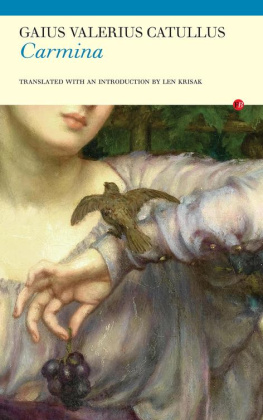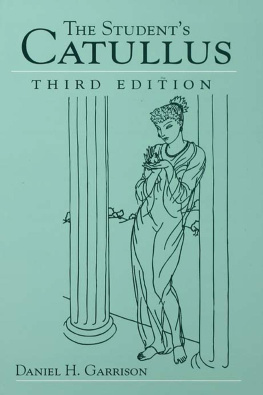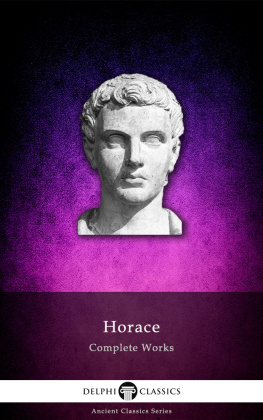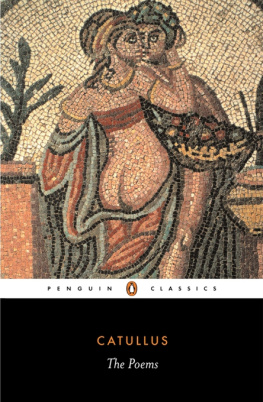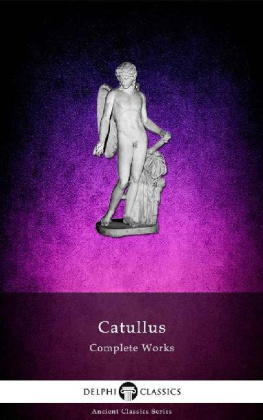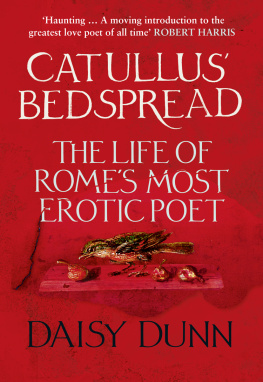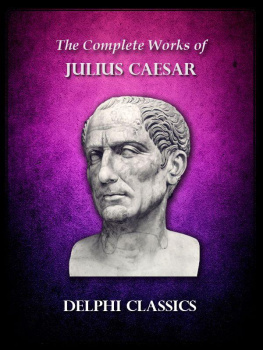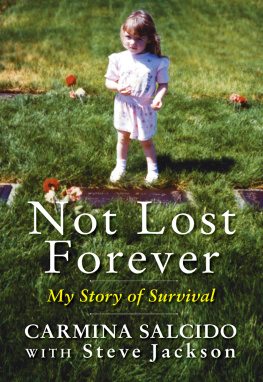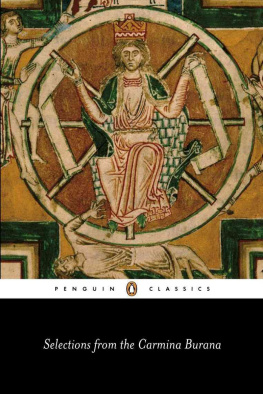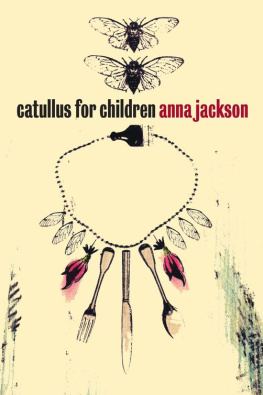FyfieldBooks aim to make available some of the great classics of British and European literature in clear, affordable formats, and to restore often neglected writers to their place in literary tradition. FyfieldBooks take their name from the Fyfield elm in Matthew Arnolds Scholar Gypsy and Thyrsis. The tree stood not far from the village where the series was originally devised in 1971. Roam on! The light we sought is shining still.Dost thou ask proof? Our tree yet crowns the hill,Our Scholar travels yet the loved hill-side from Thyrsis for Ruth
I wish to thank the editors of the following periodicals in which these translations first appeared, sometimes in slightly different form:
Able Muse Review (XXII)
Arion (I, II, IIb, III, LVIIIb)
Artful Dodge (XIII)
Barely South Review (LXIX)
Blackbird (XXXIX, XL)
Classical Outlook (XXIII, XXIV, XXV, XXVI)
Crosstimbers (CII, CIII, CIV, CV, CVI)
Fiddlehead (XXIX)
Hamilton Stone Review (LIII)
Modern Poetry in Translation (V, XLVIII, L, LXX, CVIII, CXI)
Plume (XIII)
PN Review (IV)
Riprap (XXI, LXXI, LXXII)
Rosebud (XIV, XIVb, LXXXVII)
SpoKe Magazine (XV, XXXIV, LI, LXV, LXXIII, LXXXV)
Stand (X, XI, XII)
Turks Head Review (C, CI)
Verse Wisconsin (XLVI)
Warwick Review (XLIV) In translating the
Carmina of Catullus, I have consulted the following: Balmer, Josephine,
Catullus: Poems of Love and Hate. London, 2004. Copley, Frank O.,
Catullus: The Complete Poetry Translated.
Ann Arbor, 1964. Green, Peter, The Poems of Catullus. Berkeley, 2005. Gregory, Horace, The Poems of Catullus. New York, 1956. Lee, Guy, The Poems of Catullus. Oxford, 1990.
Martin, Charles, The Poems of Catullus. Baltimore, 1990. Meyers, Reney, and Ormsby, Robert J., Catullus: The Complete Poems for American Readers. New York, 1970. Michie, James, The Poems of Catullus: A Bilingual Edition. New York, 1969.
Sesar, Carl, Selected Poems of Catullus. New York, 1974. Sisson, C.H., The Poetry of Catullus. New York, 1966. Whigham, Peter, The Poems of Catullus. Harmondsworth, 1966. Zukofsky, Celia, and Zukofsky, Louis, Catullus.
London, 1969. My special thanks to the members of the Powow River Poets.
1. Life Gaius Valerius Catullus (8454 BC) was born in Sirmio, on Lake Garda, to a wealthy landed family. In Rome in his youth, he became familiar with, or befriended, a number of contemporary poets (the
Carmina, for example, are dedicated to the poet Cornelius Nepos). He clearly studied the works of Sappho and other Greek and Hellenistic models, eventually becoming a member of the group of versifiers called
neoteric, for their new style, which encompassed elegance, difficulty, sophistication, and learned allusion.
Poem LI, for example, is a reworking of a famous poem by Sappho. It is written in her eponymous stanza form, and follows the original fairly closely, then seems to indulge in a kind of Horatian clinamen, or swerve, at the end. We know Catullus had a brother, whose death he honoured in one of the more famous of his Carmina, CI, a moving elegy. Time spent in Bithynia (in northwestern modern-day Turkey) on the staff of the propraetor C. Memmius in 5756 BC led to some of Catulluss more mordant poems, which appear to attack his superior more on the grounds of that figures failing to share the looting of the province than on the basis of any ethical objections. 2. 2.
The Poems Instead, he lets his imagination loose on love affairs, mythology, and the everyday annoyances of Rome and its more-than-interesting cast of questionable characters. Most prominently and Catullus is probably more famous for these poems than even his well-known obscene squibs and epigrams he chronxiicles the tempestuous highs and lows of an intense love affair with a certain Lesbia (probably Clodia, the sister of Publius Clodius Pulcher and wife of Q. Caecilius Metellus). The poems that deal with his relationship to this married woman are alternately tender and scathing, elated and excruciating, as the affair progresses and implodes. Although we cannot be sure whether LXXXV an anguished elegiac couplet that actually employs the word excrucior refers to this affair, it certainly captures the suffering of a passionately conflicted love: Odi et amo. [I hate and love her. [I hate and love her.
Why, you ask? I do not know, But tortured, only feel that it is so.] Whether the graph of thrilling desire and disillusioned bitterness that these poems plot is an accurate (but of course artfully reimagined) picture of Catulluss actual relationship with Clodia, or instead a highly sophisticated but wholly imaginary construction of poetic possibilities involving a purely notional Lesbia, la Ovids Heroides, may have to remain an open question. Not unlike Shakespeares sonnets, these poems totally convince us, on the one hand, that such a stormy affair is real, in all its wild zig-zags through Catulluss heart, and on the other hand offer nothing implausible in seeing the Carmina as a skilled, distancing, poetic construction. In other words, Catullus may be so skilled a poet that much, if not most, of this passion and angst is a complete fabrication, put in the mouth of that famous all-purpose literary-critical construct we know as the persona, or mask. Perhaps admitting this ambiguity is one of the highest tributes we can pay the poet. It was, after all, Yeats that modern figure who perhaps best exemplifies the twentieth centurys morphing of high romanticism into austere sexual realism who wrote to mock a certain set of classical scholars, Lord, what would they say /Did their Catullus walk their way? A goodly number of the 114 to 118 poems in the Carmina (the number varies depending on whether one splits certain poems in two, and because there is a gap in the manuscripts early on) were for decades kept from the eyes of schoolboys or included in editions only in their original Latin. The occasion for literary blushing is obviously long past in our culture, but even so, the student coming to these sexually explicit (and often cruelly hostile) expressions of Catulluss spleen may wonder, why so much fury? Or is this all just wildly inflated comic exaggeration ? After all, the poems clearly in the scatological category dont seem to our poet unfit companions for the most soaring (and searing) of love epics and epigrams, so perhaps all we can do is accept them as at least a genuine, if small, part of what Catullus is.
In my translations of these pieces, I have tried to strike a compromise between the gross and the euphemistically cute. Only the reader can judge with what success the right tone has been struck. When Catullus refers in the very first, dedicatory, poem of the Carmina to his novum libellum, his new little book or booklet, he probably means the entire set of poems we now possess, though some scholars have speculated that the phrase refers to a small collection of pieces lost to us. In either case, this opening welcome to the work introduces a set of about 60 individual poems, sometimes called the polymetrics (for their use of a number of different metres), almost all of which are fairly short. They constitute a kind of anthology of different prosodic treatments of love and various social-satirical targets. These are followed by a central section of long poems (and in one case, LXIV, a virtual mini-epic of over 400 lines), mostly acting as celebratory wedding pieces (epithalamia) or choral song contests with marriage celebration as the theme.

